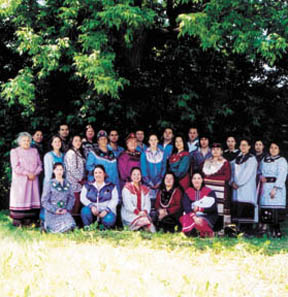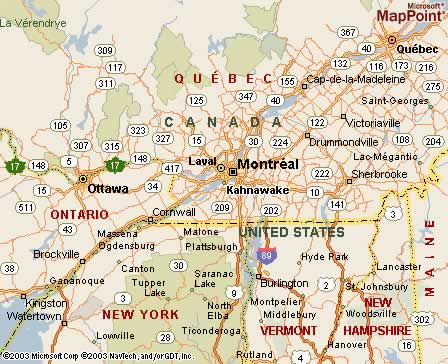|
 The
students of the Kanien'keha Ratiwennahnirats (Literacy Certificate
Program) have completed their studies and will graduate today
at a ceremony at the Knights of Columbus Hall. The past year
has been a struggle for these students but now that they have
finished they all agree that it was well worth the time and
the effort that was involved. The
students of the Kanien'keha Ratiwennahnirats (Literacy Certificate
Program) have completed their studies and will graduate today
at a ceremony at the Knights of Columbus Hall. The past year
has been a struggle for these students but now that they have
finished they all agree that it was well worth the time and
the effort that was involved.
Each
of the 24 students enrolled in the program improved by leaps
and bounds with their speaking ability and understanding of
Kanien'keha. At the start of this program each of the students
were required to have a certain level of knowledge of the
language. Now the students are far past what their level used
to be and are proud to call themselves Kanien'keha speakers.
"I
loved it," Akwiratekha Martin said. "It was the
best year of my life. This was the best thing that I ever
did."
Throughout
the school year the students had classes at the United Church
Hall on the Old Malone Highway. The building itself was an
English-free zone where only Kanien'keha was spoken. At the
start of the program for many of the students this was a difficult
reality. But as they progressed through the school year their
Kanien'keha abilities improved.
"It
changes your life," Akwiratekha continued. "I wish
it could continue."
Their
last day of classes was Friday, June 20, and each of them
left with new friends, new experiences and with the ability
to speak Kanien'keha. As they wrapped up classes many of the
students expressed that they felt the program wasn't long
enough.
The
purpose of this program was to train new Kanien'keha teachers,
not necessarily for classroom work, but in all walks of life.
The
students went on field trips and had activities where they
were able to use the language in practical settings, not just
in the classroom. These students also spent time in the classrooms
of Kahnawake's schools where they got the opportunity to use
the language and learn from other Kanien'keha teachers.
Several
of the students are planning on entering McGill University,
either in the fall or next year, for either the Teacher Training
Program or in the Bachelor of Education program. Their intent
is to eventually come back into the Kahnawake school system
and teach Kanien'keha. Some of these students have even applied
to be Teacher's Aides at Karonhianonhnha Tsi Ionterihwaienstahkwa
or at the Kahnawake Survival School. Some of the students
will even be bringing the language to our local airwaves on
K103 Kahnawake.
Akwiratekha
has plans on going to McGill University to study linguistics.
However, he said he has to wait one year before he is eligible
to enter university as a mature student. He wants to study
linguistics in hopes of applying that knowledge to the Kanien'keha
language.
"My
goal is to study the language until I die," Akwiratekha
said.
"No
matter what I do, I want to at least offer children the opportunity
to know who they are and their language," Tsoié:'on
Robertson said.
Tsoié:'on
plans on entering McGill next fall in the Bachelor of Education
Program where she wants to major in physical education. She
said she would like to combine phys-ed with the language.
"Every
day I use it (Kanien'keha) with [other] people who can speak
it," she said. "I speak it to my children and I
try to teach it to people who want to learn."
Karonhiahente
Little Bear would like to use the knowledge that she gained
throughout this past year to teach. She also said that she
would like to work with Kahnawake's elders. Karonhiahente
said before taking this program she could understand Kanien'keha,
but couldn't speak it.
"I
use it every day," she said. "I've improved 100
percent. Before I understood it fully, but now I can converse
[in Kanien'keha]."
One
of the things that Wahsontiio McComber enjoyed about taking
part in Kanien'keha Ratiwennahnirats was learning the different
ways to look at a word and to break it down to learn what
it means.
"It
helped us to learn new words," she said.
Wahsontiio
would like to become a Kanien'keha teacher at one of Kahnawake's
schools. Since taking this program she now uses Kanien'keha
at home where she uses it with her stepson. She says she started
to tell him to do things in Kanien'keha and now he won't do
anything unless she tells him in the language.
For
Kanerahtiio Hemlock, one of the most rewarding things about
this past year is being able to converse in Kanien'keha. For
him, taking this program was definitely worth the time and
effort.
"For
me the best thing is being able to have a conversation with
my great grandmother in the language," Kanerahtiio said.
"It's more rewarding than you think. It's nice when you're
speaking with your classmates and people around you just stop
and listen."
Karahkwénhawe
Goodleaf said the program really helped her improve her speaking
abilities. Prior to the program she said she could read and
write in Kanien'keha but it was difficult for her to speak.
"It
was hard for me to find the words," she said. "It's
easier for me to speak [Kanien'keha] now." Karonhionnions
Diabo agrees.
"It
was a good learning experience," she said. "It taught
me how to use the language, it's not just niá:wen and
ó:nen."
Niioronhiá:'a
Jacobs believes that with programs like this and continued
use of Kanien'keha that the language can survive. She said
that the language has to be used everyday and in public places.
That way the people who have a moderate understanding of the
language, but are afraid to use it, will become more comfortable
and will speak it.
"It
has to come natural," she said.
Let's
hope it does.
|


 The
students of the Kanien'keha Ratiwennahnirats (Literacy Certificate
Program) have completed their studies and will graduate today
at a ceremony at the Knights of Columbus Hall. The past year
has been a struggle for these students but now that they have
finished they all agree that it was well worth the time and
the effort that was involved.
The
students of the Kanien'keha Ratiwennahnirats (Literacy Certificate
Program) have completed their studies and will graduate today
at a ceremony at the Knights of Columbus Hall. The past year
has been a struggle for these students but now that they have
finished they all agree that it was well worth the time and
the effort that was involved. 